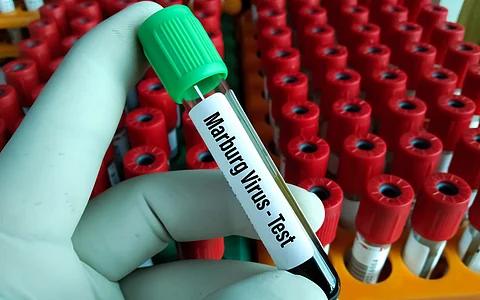

Rwanda has successfully managed its first-ever Marburg Virus Disease (MVD) outbreak officially declared over after a 42-day countdown, with no new cases since the last patient tested negative twice for the virus.
This marks the conclusion of Rwanda’s first-ever MVD outbreak, which was initially confirmed on September 27, 2024, stated World Health Organization (WHO) Africa in a statement on December 20, 2024.
A total of 66 confirmed cases and 15 fatalities were recorded during the outbreak. Around 80 per cent of infections occurred among health workers, who contracted the virus while delivering care to colleagues and other patients.
In order to contain the outbreak and preserve lives, the Rwandan health authorities developed a comprehensive response with assistance from WHO and allies.
Disease surveillance, extensive testing, infection prevention and control, strict contact tracing, clinical care, and public awareness campaigns were among the crucial actions.
These efforts significantly curbed the spread of the virus, halving cases between the second and third week after detection and declining by around 90 per cent thereafter.
MVD, previously known as Marburg haemorrhagic fever, is a severe and often fatal illness in humans, with an average case fatality rate of around 50 per cent. The virus is initially transmitted to humans from fruit bats and spreads through direct contact with the bodily fluids of infected individuals, as well as contaminated surfaces and materials.
The disease is named for Marburg, the German city where scientists became ill with the disease’s first known cases in 1967, while handling monkeys imported from Uganda.
Most outbreaks in the past have been reported from sub-Saharan African countries. These include Tanzania, Equatorial Guinea, Ghana, Uganda, Angola, Democratic Republic of the Congo, Kenya, Zimbabwe.
According to the WHO, past outbreaks have shown fatality rates ranging from 24 per cent to 88 per cent. In one of the largest outbreaks during 2004-2005, in Uige Province, Angola, there were 374 cases of infection of which 329 resulted in fatalities, a fatality rate of around 88 per cent. However, in the recent Rwanda outbreak, the fatality rate was relatively low at approximately 23 per cent.
“With case fatality rates (CFR) for Marburg outbreaks the world over known to range from 24 per cent to 88 per cent, Rwanda’s 22.7 per cent CFR has set a new regional benchmark for managing filovirus outbreaks,” said Brian Chirombo, WHO Representative in Rwanda.
While there are no approved vaccines or antiviral treatments for MVD yet, several vaccines and drug therapies are currently under development. For instance, Sabin Vaccine Institute’s single-dose vaccine is in Phase 2 trials in Uganda and Kenya and the institute provided its investigational Marburg vaccine to Rwanda to support the ongoing outbreak response.
“The robust response by Rwanda shows how committed leadership, concerted efforts by partners, and a strong health system are crucial in addressing public health emergencies, saving and protecting lives, as well as safeguarding the health of individuals and communities,” said Chirombo.
The response was bolstered by WHO, which deployed approximately 20 of the world’s leading experts on filoviruses (Ebola and Marburg) on a rotating basis from regional and headquarters levels, alongside the entire country office team. Additionally, WHO mobilised 39 health experts from the AVoHC-SURGE cohort hailing from Uganda, Liberia and Sierra Leone. This marked the largest deployment of first responders ever.
These collective actions ensured effective management of the outbreak, culminating in the last confirmed case testing negative on November 7, 2024, and the subsequent declaration of the outbreak’s end.
WHO will continue supporting the Ministry of Health in implementing and sustaining a comprehensive care program for MVD survivors, aiding them in managing any long-term after-effects, announced Chirombo on behalf of the WHO.